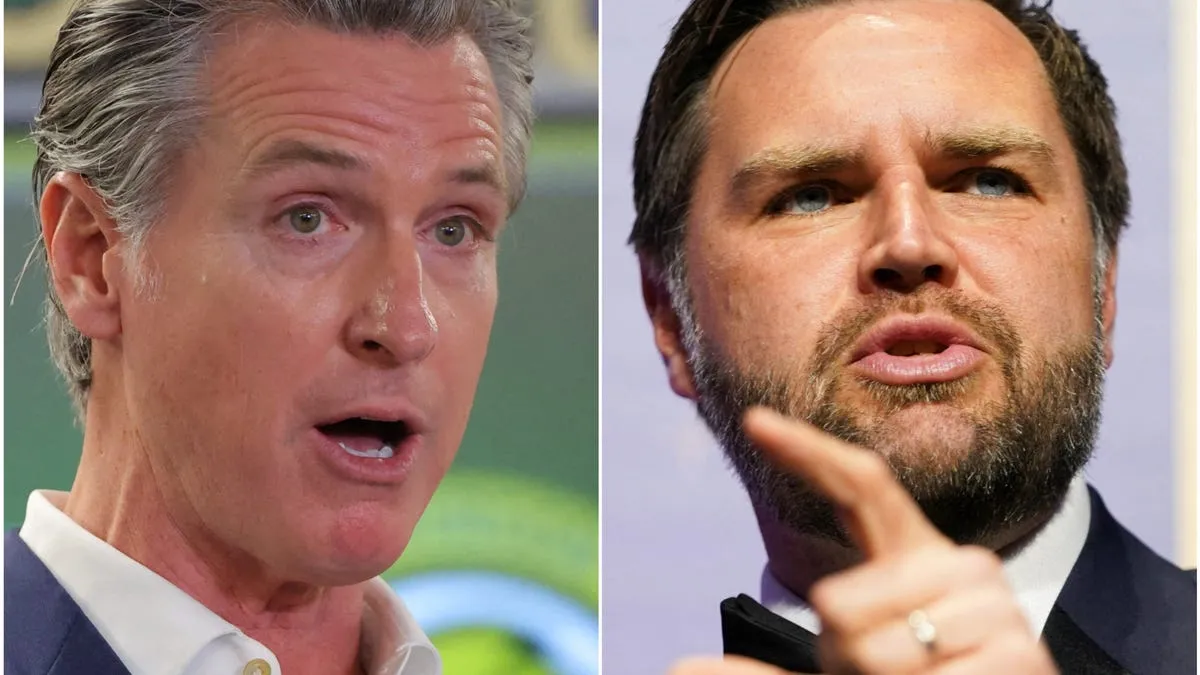
California Governor Gavin Newsom is fiercely defending his administration's response to the escalating protests in Los Angeles over President Donald Trump's controversial immigration policies. As tensions rise, Newsom finds himself in a heated exchange with prominent Republican figures, including Vice President JD Vance and Senator Tom Cotton of Arkansas. The situation has intensified following the Trump administration's deployment of National Guard troops to manage protests against immigration raids, sparking a significant backlash from the Golden State's leadership.
The Trump administration has ordered the mobilization of approximately 700 U.S. Marines and 2,000 National Guardsmen to address the protests in Los Angeles. This deployment aims to restore order amid the unrest surrounding immigration enforcement actions. In response, Newsom criticized Trump’s suggestion that Governor Newsom should be arrested, stating, "The President of the United States just called for the arrest of a sitting Governor. This is a day I hoped I would never see in America." He emphasized the gravity of this comment, warning that it represents a dangerous step toward authoritarianism.
In light of the escalating situation, Governor Newsom has taken decisive measures, deploying an additional 800 police officers and pursuing legal action against the Trump administration. He issued a warning to Los Angeles residents via social media, urging them not to "take Trump’s bait" and to remain peaceful amidst the chaos. He stated, "Trump wants chaos, and he’s instigated violence. Stay peaceful. Stay focused. Don’t give him the excuse he’s looking for."
In a sharp rebuke, White House Communications Director Stephen Cheung labeled Newsom as "the biggest cuck in American politics," accusing him of permitting "domestic terrorists" to wreak havoc in California. Cheung's comments reflect the deepening divide between state and federal authorities, as the Trump administration insists on the necessity of military intervention to safeguard federal law enforcement officers and buildings.
Governor Newsom has taken legal steps against the Trump administration, claiming a violation of California's sovereignty. His lawsuit argues that “one of the cornerstones of our Nation and our democracy is that our people are governed by civil, not military, rule.” He accuses Trump of exploiting the protests, which were under local control, for a "power grab." Newsom used the official governor's website to criticize the federal troop deployment, asserting that he would send state police to address the issues created by the president.
The conflict has escalated on social media, with JD Vance urging Newsom to take responsibility for the chaos before blaming Trump. In a quick exchange, Newsom shot back, "Do YOUR job. We didn’t have a problem until Trump got involved. Rescind the order. Return control to California."
Senator Tom Cotton also joined the fray, blaming the Democratic party for the unrest, stating, “They demand open borders, or they will riot.” Newsom countered, asserting that it is Trump and his allies who are inciting violence and illegally militarizing the city.
In the midst of the turmoil, Representative Jim Jordan expressed disdain for the protestors waving foreign flags, while Newsom quipped back with a reference to the January 6 insurrection, showcasing the ongoing political tensions. Senator Tommy Tuberville echoed Trump’s call for Newsom's arrest, which Newsom countered by highlighting Alabama's higher homicide rate, suggesting Tuberville should focus on local issues.
The ongoing clash between Governor Newsom and President Trump, alongside their respective parties, highlights a profound divide in American politics. As California grapples with the implications of federal intervention, the discourse surrounding immigration policies and state sovereignty continues to be a contentious battleground. With each passing day, the situation remains fluid, raising questions about the balance of power between state and federal authorities.